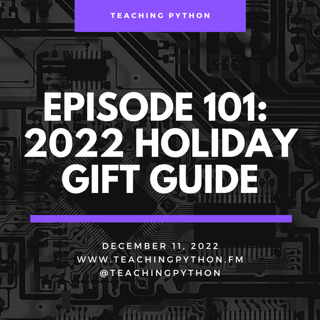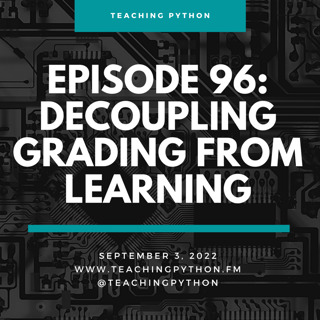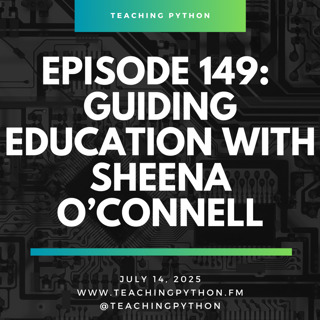
Episode 102: The Learner Variability Project
In Episode 102 of the Teaching Python podcast with Kelly and Sean, the topic is learner variability, based on an article by Jessica Jackson of the Digital Promise Project. This episode discusses how to effectively teach programming to a diverse group of learners, and how to adapt to the individual needs and learning styles of each student. One key point discussed in the podcast is that students learn at different times and at different rates, and it is important for teachers to recognize and accommodate this variability. The old theory of learning styles, which suggests that individuals have a preferred style of learning and that teaching should be tailored to these preferences, has been debunked as a myth. Instead, research suggests that the most effective way to teach is to use a variety of methods and approaches, and to allow students to engage with the material in different ways. In addition to incorporating teaching strategies such as scaffolding, differentiation, and formative assessment, it is also important for teachers to consider the various learning factors that may impact their students. This includes designing for students who may be at the margins, such as those who are struggling or those who are advanced. It also involves designing with context in mind, taking into account the unique experiences and background of each student. This can include cultural factors, language barriers, and any prior knowledge or skills that may be relevant to the material being taught. Designing with the whole child in mind involves considering not just the cognitive aspects of learning, but also the social and emotional aspects. This may involve creating a positive and supportive learning environment, and being attuned to the needs and well-being of each student. Finally, designing for powerful experiences involves creating engaging and meaningful learning activities that are likely to have a lasting impact on students. By considering these various learning factors, teachers can create more effective and inclusive learning experiences for their students.
24 Dec 202249min

Episode 101: 2022 Holiday Gift Guide
Welcome to Teaching Python, the podcast all about sharing tips, tricks, and insights on teaching and learning the Python programming language. In this episode, Kelly and Sean are giving you a list of 10 gift ideas for computer science teachers and learners. Whether you're a teacher looking for some inspiration for your holiday wishlist, or a student looking for a gift for your favorite computer science teacher, this episode has you covered. From practical tools like an online course about Python, to fun gadgets like a Lego rollercoaster or desktop robot, there's something for everyone on this list. So join Kelly and Sean as they share their top 10 gift ideas for computer science teachers and learners. And as always, if you have any questions, comments, or suggestions for future episodes, be sure to send us an email at info@teachingpython.fm. Happy holiday season and happy coding!
11 Dec 202248min

Episode 100: Celebrating Motivation (with @mkennedy & @brianokken)
After 100 episodes of Teaching Python, Kelly and Sean invite some friends of the show to share how they stay motivated. We're joined by Michael Kennedy (https://twitter.com/mkennedy) and Brian Okken (twitter.com/brianokken) from the Python Bytes (https://pythonbytes.fm/) podcast to talk about the ways we stay motivated. Listen in for tips and strategies from a variety of sources. How do you stay motivated? Special Guests: Brian Okken and Michael Kennedy.
5 Nov 202246min

Episode 99: LIVE: The Art of Searching It Up
The Teaching Python podcast speaks about how the Google Cycle can help support learning in Code. Teaching kids to “embrace the research side of Coding (and become great at this skill)” “Now we aren’t talking about googling for solutions. But smart googling with a big perspective.” → Kelly is starting a Boot camp, the prework module actually says and explains: “If you get stuck, remember that you can usually get help by searching online.” THere are guidelines to how to search and how to read Stack Overflow. “A good rule of thumb is to use code you find as a resource, not a solution.” “While google may have many answers, it’s no replacement for your own mind! Avoid relying on google to find out the programming solutions to the bare fundamentals of your chosen programming language.” This means not being tempted to use your search tools as a replacement for memorising the basics of your programming language. While technically you’ll quickly find the answer for the most basic questions to some programming queries (e.g. how to print to console) you certainly don’t want to be reaching for google every time you need to use this!
28 Okt 202248min

Episode 98: Robotics with RobotLab
The Teaching Python podcast speaks with Elad Inbar, founder of RobotLab and Robots for Education and how to improve student engagement by using robots. Special Guest: Elad Inbar.
20 Okt 202249min

Episode 97: Beyond Computer Science Classrooms
Sri Kundurthy, a student and EuroPython speaker joins Kelly and Sean to talk about bringing Python to other subject areas. From physics models to data manipulation to advanced algorithms, we talk about a wide range of applications for computer science outside of the computer science classroom Special Guest: Srivatsa Kundurthy.
19 Sep 202246min

Episode 96: Decoupling Grading
Kelly and Sean discuss how grading and learning are often confused with each other. We settle in for a chat about everything from intern projects to class challenges to communicating actual learning through grades. Settle in for an episode with just the co-hosts of Teaching Python!
3 Sep 202250min

Episode 95: Managing Your Teacher Workload
The Teaching Python podcast speaks with Pete Dring and the tools he has created to manage his workload while teaching computer science and Python. Join us to learn more about these tools and how you can use them to shift your workload from boring to exciting! Special Guest: Peter Dring.
22 Aug 202249min






















